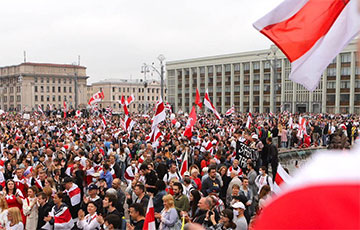Lukashenka Faces His Weakest Point
25- 24.02.2021, 9:56
- 31,174

Protests will rise, and he will fail for sure.
The authorities have recently voiced many initiatives to "cut off" private business, refuse from the market economy, which de facto we did not have, and return to the economic practices of the distant Soviet past.
In practice, many of these ideas are already being implemented. Retail chains are being "cut out", banks are being suppressed, individual entrepreneurs are being repressed, and so on. However, the bicycle plant is being "saved"; there are plans to waste another billion dollars for additional modernization of the infamous woodworking industry, finance another state "titanic industries" and, of course, the collective farms, writes Yuri Pshennik in an article on Nashe Mnenie.
In principle, one can compare it all to Stalin's abolition of the NEP. It brought impoverishment, followed by the Holodomor, increased repression, and other similar phenomena. Moreover, the shortage of food, for example, began immediately after the abolition of the NEP, already in 1928, that is, even before collectivization. It began to increase the supply of food from the peasants to the state. The result was the opposite - famine, not abundance. It's not about us yet. However, prosecution for imports, including food, up to criminal one together with the suppression of private business cannot bring any good result. It results only in the deterioration of the economic situation.
We have the "wrong" retail chains shut down. The Bolsheviks used to "cut off" the merchants. They said the merchants were parasites. The state plan will distribute everything fairly. After that, there was a constant shortage of consumer goods. Right up to the collapse of the USSR. We still have "everything" in the stores, although it is getting more expensive every day. However, the process of cutting out the merchants is still in its early stage. This policy will lead to the collapse of at least the standard of living. It has already begun. It's enough to look at the utility bills in January. Look at the prices in stores and drugstores. It is just the beginning. Things will get much worse in the economy later. It will affect not only the "ordinary people" but also the lower levels of the "vertical power structures" with the security forces.
The HTP is very likely to be destroyed. One tried to do it a few years ago. Likewise with the rest of the non-state business. The NEP is cancelled, a "Holodomor" is ahead. Yes, not all private business will be shut down, seized or nationalized. Something will formally remain private. They will replace the owners with people the government needs, etc. Anyway, this is the degradation of the private sector of the economy and the economy in general.
Thus, the state sector cannot bear new ideas as there is only one "generator of ideas", stuck in the past and making decisions that finish off the economy, instead of saving it. The economy falls behind his control. So he has decided to "destroy" it.
The regime has weak points, though. Lukashenka started a war on the very front where he almost always loses - the economy. Again, he must lose with a probability of 99% or even 100%. Either the people will accept total impoverishment, or the regime will fall. The lower echelons of the "power vertical" and the security forces will also have to put up with it: the "cut-off" in the economy will strike them. After all, they go to the stores and pay the utility bills. So, the protest base should grow in theory.









